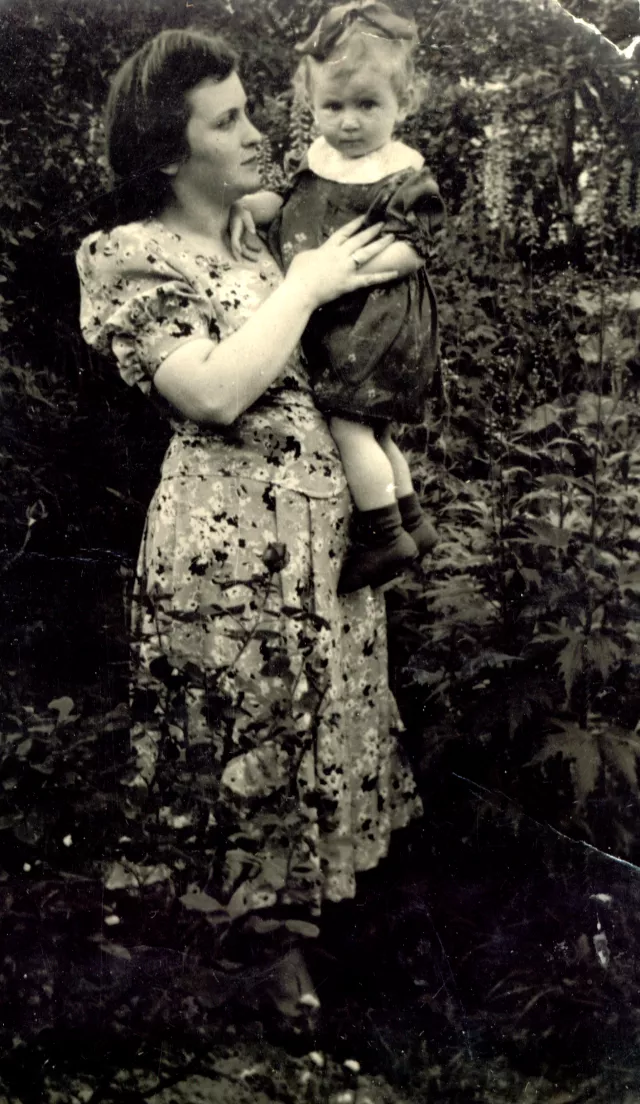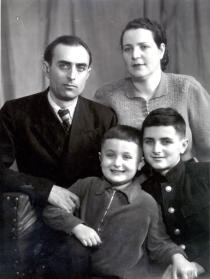This is I with my elder daughter Lina in evacuation in village Mamafe in 1944. I took the picture and sent it to my husband to the front for him to see how our daughter grew.
In 1938 I found a job as the governess. I worked for a wealthy Jew Finkelstein. In summer 1940 my host as usual rented dacha for the whole family and went there with them. We were living in the village not far from Kaunas. There was a wonderful nature here- woods and lakes. I often went to the lake and once I noticed one young man looking closely at me. The next day he invited me for a date. I understood at once that he was the man of my dream. He was my ideal- much older and more mature than me. Though, he a Lithuanian, but it did not stop me. Soon we became close. Benis (full name Benedictus) Rutkauskas was born in 1904 in a small Lithuanian hamlet not far from Vilkovishkis. He was a peasant.
On 12 December 1940 Benis and I registered our marriage in the state marriage registration authorities. We had no wedding, no rings. We were happy to start a new life. Benis held as high position - he was in charge of the communications department of Kaunas oblast, he was a respectable man and the member of the communist party, but he did not want to enjoy any benefits. We rented a room. I did not work. Shortly after wedding I got pregnant and I had very strong toxicosis and I felt unwell.
Husband found out about the unleashed war right away. There was no time to wait for organized evacuation, as it was clear that fascists would enter Kaunas soon. Benis quickly organized our departure.
We got off at Kuchmar station, which was not far from Kazan [Tatarstan, about 800 km to the East from Moscow]. We settled in a small room in the house of the locals, who treated us very kindly. Husband went to work. Here we lived two month and a half until I bore a baby. My girl came into the world in late August 1941. Husband wanted to call her Lena after Lenin, but her name was accidentally written Lina. When the daughter was born, we moved to the village Mamafe, not far from Kukhmar. It was easier to survive in a village at that time.
The four of us lived together until the New Year of 1942. Husband worked in kolkhoz, and got skimpy trudodni. Our life was hard like it was with most fugitives. Benis was eager to go in the lines. He volunteered to join 16 Lithuanian division as soon as it was founded.
I stayed with Lina. We were living at home, where five families of evacuated lived. There were no Jews among them, I was the only Jew there. Mother and daughter from Latvia, two Lithuanian old ladies, young Lithuanian with a baby and Russian family were living in one house. We were very friendly, helping each other. It would be unlikely to survive in those years without each other's help. Our house at the end of kolkhoz orchard and I was hired to watch it along with the adjacent gardens. It was not a hard work. Besides, I was given fruit, vegetables and honey from the apiary. The deputy chairman of kolkhoz often called me over to wash the floors in his office or do some other odd jobs. Every time I was given a loaf of bread for that. When the horse was cut in kolkhoz he asked me to come over and gave me a piece of meat. In the morning we, the ladies fugitives, took the jugs and came to the shed where the milkmaids brought the milks to be given to the state. Each local lady from kolkhoz gave us a little bit of milk. at times we would get only a glass, but there were cases when I could bring the whole jug for my girl. Once, I was asked to wash the floors in the dairy premises and I was given couple of spoons of butter for that. It was a real riches. All I brought home was shared with my neighbors as they also had the kids.



















